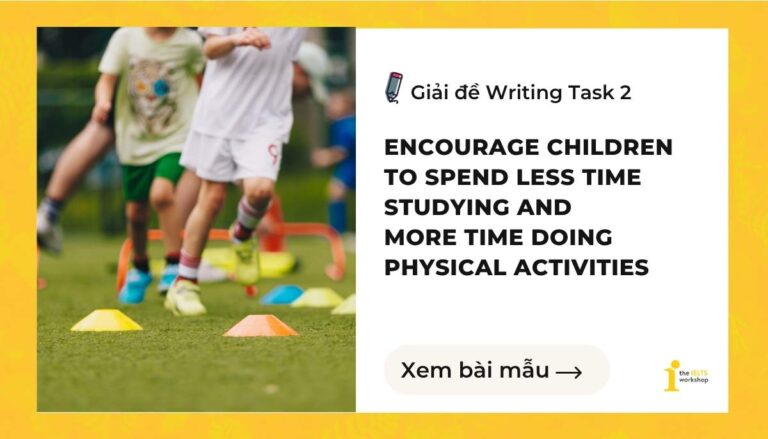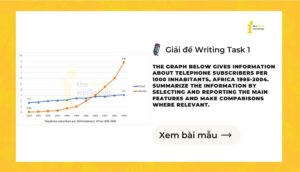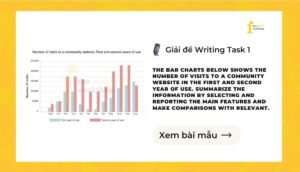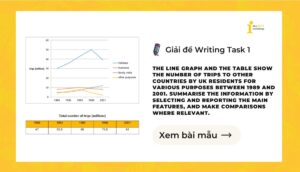Trong chuyên mục Giải đề IELTS Writing Task 2 tuần này, thầy Phạm Duy Anh – giáo viên tại The IELTS Workshop sẽ cùng bạn khám phá chủ đề encourage children to spend less time studying and more time doing physical activities nhé!
1. Phân tích đề bài
1.1. Đề bài
Parents should encourage children to spend less time studying and more time doing physical activities. To what extent do you agree or disagree?
(Cha mẹ nên khuyến khích con cái dành ít thời gian hơn cho việc học và nhiều thời gian hơn cho các hoạt động thể chất. Bạn đồng ý hay không đồng ý ở mức độ nào??)
1.2. Phân tích đề bài
Dạng bài: Opinion essay (Agree or Disagree).
Các từ khóa chính + từ đồng nghĩa để paraphrase:
- Parents encourage children → guide, motivate, support, foster, urge.
- Spend less time studying → reduce academic workload, devote fewer hours to learning, study less.
- More time doing physical activities → engage in sports, participate in exercise, take part in outdoor recreation.
- Physical activities ↔ sedentary habits, screen time, studying indoors.
Phân tích yêu cầu đề bài:
Đề hỏi người viết bàn luận xem việc cha mẹ nên khuyến khích con giảm thời gian học để tham gia hoạt động thể chất nhiều hơn, hay không.
Yêu cầu của bài Task 2:
- Thể hiện mức độ đồng ý/không đồng ý (to what extent = đến mức độ nào).
- Có thể đồng ý hoàn toàn (vì thể chất quan trọng) hoặc một phần (vì cần cân bằng giữa học và vận động).
- Giải thích bằng các luận điểm logic & ví dụ cụ thể, và các dẫn chứng liên hệ với xã hội và sức khỏe.
Xem thêm: Cách làm dạng bài opinion trong IELTS Writing task 2
1.3. Dàn bài
Mở bài:
- Giới thiệu bối cảnh: xã hội hiện nay đặt nặng việc học, khiến trẻ thiếu vận động.
- Nêu rõ quan điểm: đồng ý với việc cha mẹ nên khuyến khích con tham gia thể chất nhiều hơn.
Ví dụ: In today’s education-oriented world, many parents place a strong emphasis on academic achievements, sometimes at the expense of their children’s physical well-being. Because of that, I strongly agree that parents should motivate their children to devote more time to physical activities instead of excessive studying, as this can lead to healthier lifestyles and improved academic performance in the long term.
Highlights: Mở bài có lead-in (câu dẫn vào bài), thesis statement (câu đưa quan điểm rõ ràng), thể hiện khả năng giới thiệu với người đọc về một chủ đề học thuật.
Thân bài
Thân bài 1: Tầm quan trọng của hoạt động thể chất.
Ý chính: Thể dục giúp trẻ phát triển toàn diện về thể chất, tinh thần và xã hội.
Luận điểm hỗ trợ:
- Nâng cao thể lực, rèn tinh thần bền bỉ, tăng khả năng giao tiếp.
- Các môn thể thao nhóm (bóng đá, bóng rổ) giúp trẻ học được kỷ luật, tinh thần đồng đội, khả năng lãnh đạo.
- Giúp phòng tránh các bệnh như béo phì, cong vẹo cột sống – những vấn đề phổ biến khi trẻ ngồi học quá lâu.
Ví dụ: First and foremost, regular physical exercise plays a crucial role in children’s overall development. It not only enhances physical fitness but also promotes mental resilience and social skills. For instance, team sports such as football or basketball teach children the value of cooperation, discipline, and leadership – qualities that cannot be learned solely from textbooks.
Highlights:
- Phát triển ý logic (nguyên nhân → kết quả).
- Kết nối chặt chẽ với đề bài và dẫn chứng thực tế.
- Từ vựng học thuật – Academic language – phong phú: overall development, mental resilience, cooperation, discipline, leadership.
Thân bài 2: Tác động của thể chất đến kết quả học tập.
Ý chính: Tập thể dục không cản trở học tập, mà còn giúp trẻ học tốt hơn.
Luận điểm hỗ trợ:
- Vận động giúp cải thiện trí nhớ, sự tập trung, khả năng nhận thức.
- Học quá nhiều lại gây căng thẳng, giảm hiệu quả.
- Lịch trình cân bằng giữa học và chơi giúp trẻ học năng suất hơn.
Ví dụ: Additionally, it is a misconception that spending more time studying automatically leads to better academic outcomes. Research has shown that moderate exercise actually improves concentration, memory, and cognitive function. For example, students who engage in regular outdoor play or physical training tend to have better concentration during lessons and perform more efficiently in examinations. In contrast, children routinely overwhelmed with homework or additional classes often suffer from stress and burnout, ultimately hampering their ability to learn effectively. Thus, a balanced schedule that includes time for exercise can make children not only healthier but also more productive learners.
Highlights:
- Có đối lập logic (“It is a misconception that…” → “In contrast…”).
- Giọng văn thuyết phục, lập luận chặt chẽ, ví dụ cụ thể.
- Sử dụng collocations tốt: balanced schedule, cognitive function, productive learners.
Thân bài 3: Nhấn mạnh vai trò của việc học và sự cân bằng giữa việc học và giải trí.
(Note: Các bài văn IELTS bình thường chỉ cần 2 đoạn cho các ý chính, nhưng người viết có thể thêm một đoạn Body 3 để chốt lại ý chính, nếu chốt lại ý trong phần Kết bài bị dài quá.)
Ví dụ: Admittedly, academic success is still essential in today’s competitive society. However, focusing solely on studies without considering the physical and mental needs of children can be counterproductive. Parents should therefore strive to create a balanced routine, where educational pursuits coexist with recreational and physical activities.
Highlight: có phần “acknowledgement” (thừa nhận mặt đối lập) – giúp bài viết khách quan để đạt tiêu chí Task Response Band 8+.
Kết bài
- Khẳng định lại quan điểm.
- Tổng kết lợi ích toàn diện: sức khỏe, trí tuệ, kỹ năng xã hội.
Ví dụ: In conclusion, I firmly believe that children should be encouraged to spend less time studying and more time engaging in physical exercise. This balance will help foster healthier bodies, sharper minds, and stronger social skills, all of which are essential for success both in school and in life.
Highlight: Kết bài dùng parallel structure (healthier bodies – sharper minds – stronger social skills), để nâng cao sự cân bằng & khách quan trong cách trình bày ý tưởng như trên.
2. Bài mẫu
In today’s education-oriented world, many parents place a strong emphasis on academic achievements, sometimes at the expense of their children’s physical well-being (1). Because of that, I strongly agree that parents should motivate their children to devote more time to physical activities instead of excessive studying, as this can lead to healthier lifestyles and improved academic performance in the long term.
First and foremost, regular physical exercise plays a crucial role in children’s overall development. It not only enhances physical fitness but also promotes mental resilience and social skills. For instance, team sports such as football or basketball teach children the value of cooperation, discipline, and leadership – qualities that cannot be learned solely from textbooks (2). Moreover, physical activity helps prevent common health problems such as obesity and posture-related issues, which are increasingly prevalent among students who have to spend long hours sitting and studying (3). Therefore, encouraging (a) children to stay active can contribute significantly to both their physical and emotional well-being.
Additionally, it is a misconception that (b) spending more time studying automatically leads to better academic outcomes. Research has shown that (c) moderate exercise actually improves concentration, memory, and cognitive function. For example, students who engage in regular outdoor play or physical training (4) tend to have better concentration during lessons and perform more efficiently in examinations. In contrast, children routinely overwhelmed with homework or additional classes (5) often suffer from stress and burnout, ultimately hampering their ability to learn effectively (6). Thus, a balanced schedule that includes time for exercise can make children not only healthier but also more productive learners.
Admittedly, academic success is still essential in today’s competitive society. However, focusing solely on studies without considering the physical and mental needs of children can be counterproductive. Parents should therefore strive to create a balanced routine, where educational pursuits coexist with recreational and physical activities.
In conclusion, I firmly believe that children should be encouraged to spend less time studying and more time engaging in physical exercise. This balance will help foster healthier bodies, sharper minds, and stronger social skills, all of which are essential for success both in school and in life.
Sample 7.5+ by Tran Chi Bao Lam – IELTS Teacher at The IELTS Workshop
3. Vocabulary and grammar
- Vocab:
- Mental resilience : sự kiên cường (“lì”) tâm lý.
- Các kỹ năng (skill) đề cập trong ví dụ đoạn 1: hợp tác (cooperation), kỷ luật (discipline) và lãnh đạo (leadership).
- Misconception (n) : quan niệm sai lầm.
- Hamper (v) : sự cản trở (extra synonyms: “hinder”, “impede”)..
- Grammar:
- (a) Dùng Gerunds (danh động từ) làm chủ ngữ câu.
- (b) Dùng Dummy Subject (chủ ngữ giả) “It is + adjective + that…”
- (c) Dùng Reporting Verb (động từ tường thuật) để đưa ra dẫn chứng (các Reporting Verbs khác có ích trong Writing: suggest, report, claim).
- Sử dụng Relative Clauses (RC) – mệnh đề quan hệ – để viết các câu ghép (đã gạch chân ở trên):
- RC đầy đủ: (3) + (4)
- RC rút gọn: các câu còn lại từ (1) đến (6).
Xem thêm: Cách học từ vựng IELTS hiệu quả từ thầy Đặng Trần Tùng 9.0
Tạm kết
Mong rằng bài viết mẫu trên đã mang đến cho bạn một góc nhìn toàn diện và cách triển khai mạch lạc cho dạng bài Opinon trong IELTS Writing Task 2 với chủ đề encourage children to spend less time studying and more time doing physical activities.
Đừng quên theo dõi chuyên mục [Cập nhật liên tục] Tổng hợp đề thi IELTS Writing 2025 kèm bài mẫu và Bài mẫu Writing Task 2 để củng cố thêm kiến thức và kỹ năng xử lý dạng bài này
Đăng ký ngay HỌC IELTS MIỄN PHÍ tại Website của The IELTS Workshop để luyện tập cùng các giáo viên giàu kinh nghiệm và nhận được hướng dẫn cụ thể hơn nhé!









